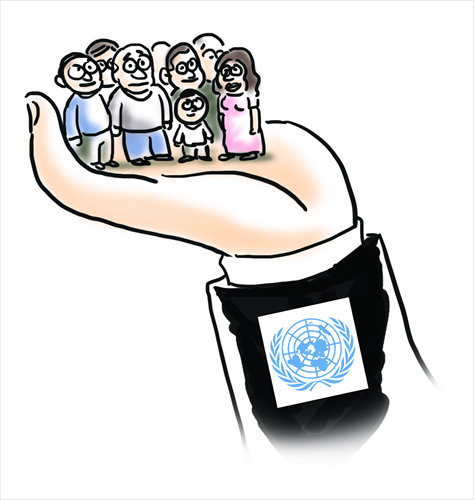Inclusive growth brings momentum to UN

Illustration: Liu Rui/GT
The 2030 Agenda is a benchmark calling for joint actions of all countries and stakeholders to achieve global sustainable development in the next 15 years. As the over-arching multilateral platform for global development, the United Nations (UN) is likely to leverage its mandates and resources to prioritize development issues, strengthen capacity-building in recipient countries for sustainable development and increasing the voices of developing countries in the UN policymaking process and personnel structure.
First, Agenda 2030 shows that the UN will prioritize development issues in the global policy agenda. As the UN Secretary-General Ban Ki-moon said in a recent UN Security Council (UNSC) meeting, "post-conflict societies must prioritize social, economic and political inclusion" and it is important to rebuild trust in local communities.
Meanwhile, development capacity-building is also critical for conflict resolution, peace restoration and conflict prevention. The UNSC also recognized the critical importance of inclusive development for preventing conflicts and enabling sustainable peace.
Therefore, more economic and social development elements should be integrated into humanitarian assistance and Official Development Assistance programs.
In particular, infrastructure development is crucial to stabilizing post-conflict societies. Large transportation, telecommunication, and other civilian projects can provide enormous employment opportunities, increase people's living standards and generate economic growth. A stable economy and political institutions can combat poverty and prevent people from resorting to extremist ideology or violent means.
Second, as an alternative to the one-size-fits-all approach, the UN's development strategy should respect the initiative and sovereignty of recipient countries in designing, managing and evaluating development models and process.
The UN member states should increase their support for capacity-building in developing countries and bridge the development-gap between "the North" and "the South."
Developing countries are more vulnerable to the alarming challenges of climate change, endemic diseases and terrorism. A healthy and dynamic economy will make developing countries more resilient to global challenges and become new engines for global economic growth, which will benefit donors and all stakeholders.
However, to achieve these goals, simply copying political and industrial models from advanced economies has proved to be problematic. Development assistance should be tailor-made to fit the most urgent needs of the recipient countries, such as poverty alleviation, infrastructure development and basic public facilities.
The UN's capacity-building support should start from the decision-making to implementation, which enables recipient countries to choose their own development models based on their respective economic, social and political conditions.
Due to proximity and similar development stages, South-South cooperation within the UN is also encouraged to share development experiences and best practices among developing countries.
For example, the Chinese government is committed to establish a South-South Cooperation Fund with an initial stake of $2 billion, helping developing countries reach the goals of Agenda 2030. The fund will increase to $12 billion over the next 15 years to help the least developed countries eliminate extreme poverty by 2030.
Regarding capacity-building, China has taken the initiative to establish a research center to provide technical assistance and personnel training to international development. China's economic model and industrial policies may offer more practical approaches for developing countries. The Chinese government can also provide support on clean technology and renewable energy.
As UNEP emphasized at the COP21 climate conference, "South-South cooperation is emerging as a key element of the global response to climate change." China pledged a $3.1 billion commitment to a climate fund to help developing countries upgrade clean technology and mitigate climate risks.
Third, to improve global economic governance, the UN should strengthen the voices and decision-making power of developing countries, in order to achieve the equal participation of member states in UN resolutions, programs and activities.
As the chairperson of the African Union and Zimbabwe's President Robert Mugabe said, developing countries should have equivalent representation in the UNSC, proportional to their population size and increasing roles in global governance. Particularly, as most UNSC resolutions directly affect developing countries, their voices should be represented in the decision-making process. Similar proposals are also reflected in the World Bank and International Monetary Fund reforms.
In the upcoming reforms, more representatives, experts and professional staff from developing countries should be encouraged to bid for senior positions in the UN.
Currently, most of the senior positions of the Secretariat are occupied by professionals from advanced economies due to historical and technical reasons. The next 15 years will witness a growing influence of developing countries in global governance.
As the largest developing country, China has become the third largest contributor to the UN. China's contribution to the UN regular budget has reached 7.9 percent of the total and its peacekeeping contribution will amount to 10.2 percent over the next three years.
As more developing countries play a larger role in global governance, professionals from developing countries are expected to actively participate in the decision-making process of the UN.
The author is a consultant at the United Nations Headquarter in New York. opinion@globaltimes.com.cn